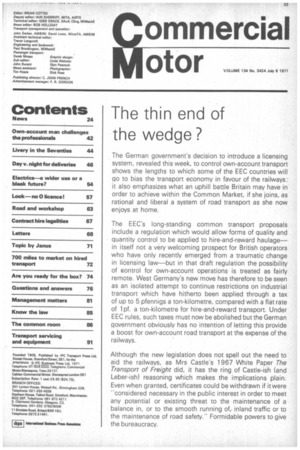The thin end of the wedge?
Page 25

If you've noticed an error in this article please click here to report it so we can fix it.
The German government's decision to introduce a licensing system, revealed this week, to control own-account transport shows the lengths to which some of the EEC countries will go to bias the transport economy in favour of the railways; it also emphasizes what an uphill battle Britain may have in order to achieve within the Common Market, if she joins, as rational and liberal a system of road transport as she now enjoys at home.
The EEC's long-standing common transport proposals include a regulation which would allow forms of quality and quantity control to be applied to hire-and-reward haulage— in itself not a. very welcoming prospect for British operators who have only recently emerged from a traumatic change in licensing law—but in that draft regulation the possibility of eontrol for own-account operations is treated as fairly remote. West Germany's new move has therefore to be seen as an isolated attempt to continue restrictions on industrial transport which have hitherto been applied through a tax of up to 5 pfennigs a ton-kilometre, compared with a flat rate of lpf. a ton-kilometre for hire-and-reward transport. Under EEC rules, such taxes must now be abolished but the German government obviously has no intention of letting this provide a boost for own-account road transport at the expense of the railways.
Although the new legislation does not spell out the need to aid the railways, as Mrs Castle's 1967 White Paper The Transport of Freight did, it has the ring of Castle-ish (and Leber-ish) reasoning which makes the implications plain. Even when granted, certificates could be withdrawn if it were -considered necessary in the public interest in order to meet any potential or existing threat to the maintenance of a balance in, or to the smooth running of, inland traffic or to the maintenance of road safety." Formidable powers to give the bureaucracy.












































































































































